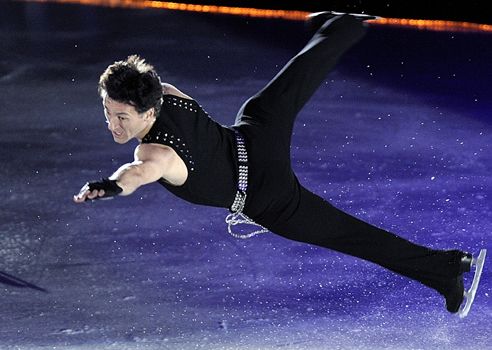Reading time: Less than 3 minutes
I’m guessing that most aspiring writers have never been serious figure skaters. Here’s why you might have more in common with that type of athlete than you imagine…
Should there be a publication ban on the names of all defendants and victims in criminal trials until a verdict has been reached?
That was just one of the questions facing two 16-year-olds I coach as debaters last weekend. They had been skillful — and lucky — enough to qualify for the Canadian National Debate championships held in Saskatoon, a small town on the Canadian prairie.
The kids have to debate mostly on an impromptu basis (so their coaches can’t write the speeches for them) and mine ultimately didn’t qualify for the finals. But they performed admirably, earned respectable scores and had lots of fun.
During the event, I heard several coaches and judges compare debating to figure skating. I’ve even made this analogy myself at previous tournaments. But here’s the point that might interest you: writing is also like figure skating. Here are five reasons why:
1 – It takes a lot of hard work to make your performance look easy and graceful. People watching figure skating don’t see the endless hours the athletes log on the ice, perfecting turns, practicing spins, building speed. Similarly, readers almost never imagine the hours of work that must be put into any published material. In addition to the writing, of course, there’s also the researching, the thinking, the planning and — most time-consuming of all — the editing and rewriting. I always advise my clients that they should spend twice as much time editing as they do writing.
2 – It’s exhausting. I think most of us understand that athletes have to work physically hard. But so do writers. The energy required to write 1,000 words can’t be compared to the energy needed to move a flat of bricks. Writing is tiring in a completely different way. It requires willpower — which is exhausting — and determination and focus. If you write diligently, you will be tired afterwards.
3 – If you practice, you will get better. Sure, having some talent — in figure skating, debating or writing — will help you start out further ahead. But the only way to improve is to practice. I was at a dinner party last night and met a former English teacher who aspired to write a book. “But I just don’t have the discipline,” he said. I suspected that wasn’t the case at all. My hunch is that he fears his writing won’t be good enough, so he doesn’t want to do it. The solution to this problem is quite straightforward: write, write again, write some more. With practice, you will always become better.
4 – When you are criticized — and you will be — consider the source. In figure skating (and debating) some judges are famous for having it “in” for certain other teams. This overly competitive attitude doesn’t take away from the merit of a really good performance. The audience knows what it sees. Similarly, in writing, be aware that not all your judges will be your friends. I’m suspicious of many (not all!) writers’ groups. Here are the questions you should consider: How much does this person actually know about writing? Do they worry that my success might impinge on their own? Are they constructive and helpful or just downright negative? The reverse might also be the problem: family members and close friends can sometimes be too unwaveringly supportive. This might result in a reluctance to say anything that they view as remotely negative.
Finally, here is the most important tip of all:
5 – Understand that whether or not someone likes your writing is almost always a matter of taste. If you were to take all the writing in the entire world — I know this is crazy but stick with me for the value of the metaphor — and put it on a continuum, only the very worst would end up at the “bad” end. And only the very best would be at the “good” end. The vast majority of the writing would be smack dab in the middle. And that’s likely where your writing is, too. In figure skating terms, some viewers prefer the artistic merit of highly emotive skaters such as the late Toller Cranston, while others favour the incredible athleticism of an Elvis Stojko (pictured above). Was one better than the other? I don’t think so. I simply believe they did different things.
Writing isn’t a competition any more than debating or figure skating is — even though we sometimes force them into that paradigm. Instead of worrying about whether you’re “winning” at writing, focus on the work and the practice and you’ll inevitably get better all by yourself.
Do you treat writing like a competition? We can all learn from each other so, please, share your thoughts with my readers and me in the “comments” section below. Anyone who comments on today’s post (or any others) by April 30/16 will be put in a draw for a copy of Telling True Stories, a collection from the Nieman Foundation at Harvard University. Please, scroll down to the comments, directly underneath the “related posts” links, below. Note that you don’t have to join the commenting software to post. See here to learn how to post as a guest.

